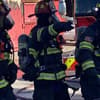Incident Command PDF - Coral Springs-Parkland Fire Department
Document Details

Uploaded by Firelaz
Coral Springs-Parkland Fire Department
Tags
Related
- Coral Springs-Parkland Fire Department Structure Fire Response PDF
- Coral Springs-Parkland Fire Department Incident Command & Control PDF
- Clearwater Fire & Rescue Department Marine Response SOP 619 PDF
- Toronto Fire Services Training Note: Transfer Of Command PDF
- Toronto Fire Services Training Note (PDF) - Incident Commanders Rules of Engagement, 2018
- Structure Fire Guidelines PDF
Summary
This document is a fire procedure manual for the Coral Springs-Parkland Fire Department, detailing incident command and control procedures. It covers topics like arrival procedures, personnel assignments, and different command modes.
Full Transcript
SOG Coral Springs-Parkland Fire Department 300 Fire Procedure Manual Incident Command and Control 300.1 PURPOSE AND SCOPE This document provides arrival and on-scene procedures to establish command for Coral SpringsParkland Fire Department units responding to emergency incidents. Emergency Resp...
SOG Coral Springs-Parkland Fire Department 300 Fire Procedure Manual Incident Command and Control 300.1 PURPOSE AND SCOPE This document provides arrival and on-scene procedures to establish command for Coral SpringsParkland Fire Department units responding to emergency incidents. Emergency Response Fireground Accountability Incident Management Staging 300.2 FIRST FIVE MINUTES The first arriving department unit should contact Dispatch and provide the following information: • Unit on-scene • Initial scene size-up • • Mode of Operations: Command, Attack, Defensive or Investigation • The Incident Commander (IC) should: #Establish the department personnel accountability system. #Perform or direct another member to perform a 360 assessment of the incident and report the results to the IC. #Declare an offensive or defensive strategy for working fires. #Confirm scene safety for all incidents. #Begin incident stabilization (reactive mode to proactive mode). #Assign critical tasks. #Call for any additional resources as appropriate. #Refer to the Unified Command Procedure if the incident involves multiple jurisdictions or multiple agencies/organizations within a single jurisdiction. 300.3 PROCEDURES 300.3.1 RESOURCE DEPLOYMENT (a) Apparatus Copyright Lexipol, LLC 2023/11/08, All Rights Reserved. Published with permission by Coral Springs-Parkland Fire Department ***DRAFT*** Incident Command and Control - 1 Coral Springs-Parkland Fire Department Fire Procedure Manual Incident Command and Control 1. (b) Apparatus should respond to the scene and position to fulfill its assignment, or stage, as directed by the IC. (a) Initial arriving apparatus should leave access for later arriving units. (b) Apparatus not immediately required for stabilization of the scene should stage in an area that allows critical units access to the scene. Personnel 1. Personnel should be in personal protective equipment (PPE) suitable for the response. 300.3.2 OPERATIONS (a) Incident Command and Command Modes 1. Whenever practicable, after establishing command the IC should declare Command Mode and not engage in any firefighting operations. He/she should locate and establish a command post and advise Dispatch and fireground personnel of the command location. 2. When the IC declares Command Mode, he/she should assign the remainder of the crew consistent with one of the following options, depending on resources and scene conditions: 3. (a) A member of the company should be designated as the acting officer and command the remainder of the crew for tactical assignments. (b) The remaining company personnel should be assigned to staff functions to assist the IC. (c) The remaining company personnel should be assigned to another company. Investigative and Fast Attack Modes (a) When the IC determines Command Mode is not reasonably practicable and, based on scene conditions and resources, decides that he/she should engage in firefighting operations, he/she should declare either an Investigative Mode or Fast Attack Mode: • Investigative Mode – The IC is with investigating crews. • Fast Attack Mode – The IC has determined that his/her direct involvement in the fire attack will make a positive difference in the outcome of the incident and participates in rescue, suppression or crew safety activities. (b) When in Investigative or Fast Attack mode, the IC should have a portable radio and make appropriate communications and assignments for incoming units. (c) As soon as it is practicable, an IC in Investigative or Fast Attack mode should either transfer command to a qualified officer who can assume Copyright Lexipol, LLC 2023/11/08, All Rights Reserved. Published with permission by Coral Springs-Parkland Fire Department ***DRAFT*** Incident Command and Control - 2 Coral Springs-Parkland Fire Department Fire Procedure Manual Incident Command and Control Command Mode or have incoming units take over investigative or fire attack tasks to allow him/her to assume Command Mode. 4. Transferring command (a) Depending on staffing and the situation, command may be transferred to a later arriving qualified officer or an officer of superior rank/experience. (b) Whenever practicable, transfer of command between the initial IC and the qualified officer assuming command should be face-to-face. (c) The IC transferring command should provide a verbal report to the qualified officer assuming command. Whenever practicable, the report should be given in written form as well and should include, but not be limited to: (d) • Conditions encountered on arrival. • Strategic and tactical objectives. • Crew assignments and locations. • Current outcome of strategy and tactics. • Any significant obstacles. • Personnel accountability report. • Plans for future operations. Following the transfer of command, the qualified officer assuming command should notify Dispatch and all incident personnel via the fireground channel that he/she is now in command. Copyright Lexipol, LLC 2023/11/08, All Rights Reserved. Published with permission by Coral Springs-Parkland Fire Department ***DRAFT*** Incident Command and Control - 3